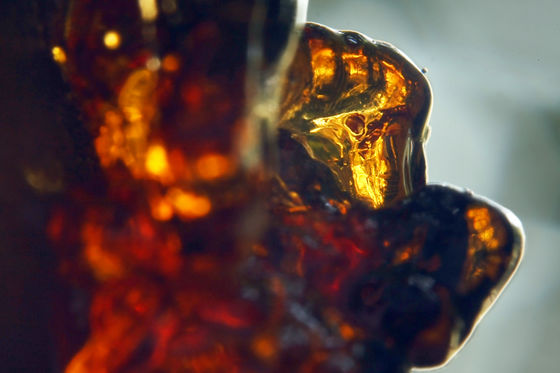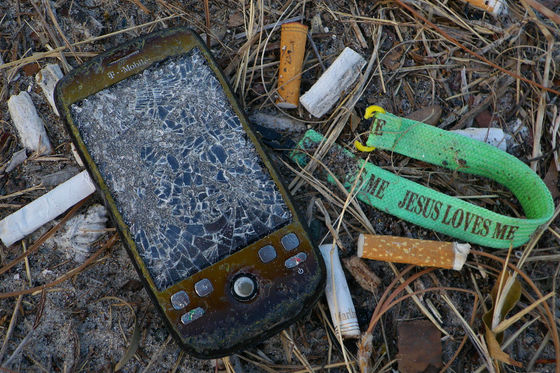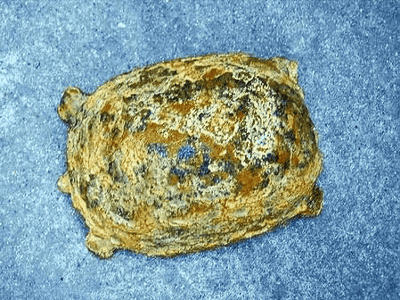Experts lecture on "How we become fossils"

byChris Bentley
fossilIs the formerly inhabited creatures trapped in the strata for some reason, mineralized mainly in hard tissues. Fossils are clues for researchers to know the ancient creatures and tell us the existence of dinosaurs and ammonites. The probability that an organism will be a fossil is very low, but the BBC is summarizing the "how to become a fossil after death" that you want to remember for when you think "I want to be a fossil" someday.
BBC - Future - How can I become a fossil?
http://www.bbc.com/future/story/20180215-how-does-fossilisation-happen
"All fossils are miracles," and nonfiction writersBill BrysonHe said "What the human race knows All short history"I am talking about. The probability of one bone becoming fossilized is said to be approximately one billionth of a billion, of the approximately 320 million people in the United States in 2018 at the time of writing the article, about 60 bones remain as fossils It is estimated. Considering that the number of bones that make up the human being is about 200, even the whole American population as of 2018 can not leave a fossil of the whole body skeleton of a human being.
Researchers estimate that the proportion of organisms that have become fossils is less than 0.1 percent among all the organisms that have existed on the earth so far, even if they are fossilized, the possibility of being found by humans is even greater It is low. However, since the human skeleton is relatively large and the bones are also hard, it is possible to have a desire to be fossilized as compared with Centipede and Gokai. Several experts told the BBC's interview "The way human beings become fossils" is as follows.

bySteven Lilley
◆ 1: Being buried soon after death
Oxford University Natural History MuseumMr. Sue Beardman, a collector and expert on fossil studies, said in response to the BBC's interview "Whether or not to fossil after all is the question of how the state of the body after death is kept, fossil It is necessary to be buried over a long period of time to a place that will not be digested or moved by wildlife. " If the dead body is buried in the place of several tens of centimeters from the surface of the earth or the seabed, it is likely to be digged up by other creatures that eat carcasses or that the soil is stirred and the fossilization will fail.
Also, if you are left in a place where you touch the air for a long time since you died, the carcasses will be rotten and it will be ruffled. In order to avoid this, it is preferable that it is desirable to be buried in a deep depth in as short a time as possible from dead. As a condition that meets the above conditions, Mr. Beardman said that it is a good idea to borrow the power of natural disasters, such as being buried in the ash instantaneously by a large eruption or being deposited in the seabed at once at the moment it is flushed by the flood I will. As an example of human beings buried by a large eruption, an ancient city in ItalyPompeiiAlthough it is associative, it is thought that some fossils of dinosaurs have been discovered together in large amounts, there are things that were thought to have been swept away by the flood.

byÓli Jón
◆ 2: Immersed in water
And unexpectedly it seems that water has an essential role in fossilization. Mr. Kitelin Shim, a fossilist at the University of Queensland in Australia, says, "Inside the river and pond is a great point to become a fossil." Besides the reason that it becomes very fragile and fragile when it becomes a bone in a dry place, it is said that the ideal environment for fossilization is completely oxygen-free and that microorganisms that decompose corpses should be used as little as possible. It seems that there is a possibility that parts other than bones will remain as fossils as well as dinosaurs with occasional feathers and fossils with internal organs tissues as long as they can well maintain the oxygen-free state.
In order to become a fossil, it is best that the threat of organisms eating carcasses such as shrimp and crabs is small, in the water which is liable to be in a low oxygen state, it is best buried deep in the ocean floor. However, it is likely that there is a problem that it is too deep, as it is too deep and the likelihood of being uncovered in the future exposed to the surface will be low.

byrenee
◆ 3: Do not enter the coffin
In the area where there are customs for burial, the corpse is put in a coffin and it is buried, but this means that there is a possibility of hindering fossilization. Fossils of 50,000 years or less become corpses "Half fossil"It is said that most of the half-fossils whose years have not passed since they became corpses mostly maintain the original organization. Half fossils have been found in caves, but if you want to remain as fossils for millions of years, you have to mineralize hard tissues such as bones.
In order to mineralize bones, water containing a lot of minerals permeates the bone and basically it reacts with iron and calcium over a period of tens of thousands of years, sometimes several million years. Therefore, if it is buried while entering a strict coffin, it seems that the possibility of remaining as a fossil over several million years is decreased, hindering the penetration of water.
However, Mike Archer, a fossilist at the University of New South Wales, says, "There is a way to make minerals even if putting corpses in the coffin." The method is to store the corpse in a concrete coffin filled with sand in the inside and keep several hundred holes with a diameter of 5 mm on the surface of the coffin. It seems that water penetrates into the coffin and mineralizes bone. Also, Archer says there is a technique to more effectively supply iron to the bones by burying ore containing much iron in the surroundings.

byJon Lewis
◆ 4: Be careful of places filled with corpses
I have explained the best burial method for fossilization above, but it does not mean that it can be buried anywhere as long as it meets the conditions. If the fossilization is successful, it will sink deeper into the ground, it will be compacted by geothermal and pressure and you can increase the strength of fossils, but if you sink too deeply there is a danger of melting in geothermal . To avoid this, it seems that we should avoid dying around the area where the plate sinks. The BBC states, for example, that the Iranian plate is subducting in the Eurasian plate, that it should avoid being buried in Iran.
Also, no matter how much it will become a fossil, it must be discovered in the future. Regardless of whether humans inhabit hundreds of millions of years after fossilization since death, it is best to fill in the ocean floor that will eventually be exposed to the surface. Mr. Shim said, "The Mediterranean is a good example, as the plate on the ocean floor is moving from the African side to the Eurasian Continent north, there is a possibility that it will be exposed in Europe in the future and other inland seas too Well,Dead SeaIt is the best position among them. High concentrations of salt are ideal for storing dead bodies. "

bySue Langford
◆ 5: Method other than fossil
For those who do not rely on being fossilized and want to preserve their bodies from anything, it is recommended that they be embedded in amber. Occasionally bodies of insects and small animals buried in amber are found, but in the state covered with amber, there are also firm non-bone tissues and it seems to be the best for preserving corpses. However, it is very difficult to get an amber enough to fill a whole human being.
Buried in glaciers, in Los AngelesLa Blair TarpittIt is also hands to be buried in a pond of natural asphalt such as. Or it seems to be recommended to make it mummified in a cave rich in minerals, but the most perfect way to preserve corpses is to launch a corpse into space. Shim said, "It is a good idea to keep the corpse in a vacuum, if you attach a radio sign to the corpse, the chances are higher that you will be able to find it even in the distant future."

byDan Bergstrom
◆ 6: Leave clues
To enhance the possibility of being found in the future, it is also recommended to fill clues such as mobile phones along with corpses. Metals and glasses used for plastics and mobile phones that are not decomposed spontaneously are extremely durable and there seems to be possibilities that smartphones remain after millions of years, leaving almost the shape.
Also, if you want to become an archaeologically valuable fossil, it is a good idea to be buried near skyscrapers and the foundations of the highway. They are very buried deep underground and are highly likely to remain for long periods. If the living background is also found at the same time as fossil discovery, the value as a fossil may increase.

byDaniel Oines
Related Posts:







